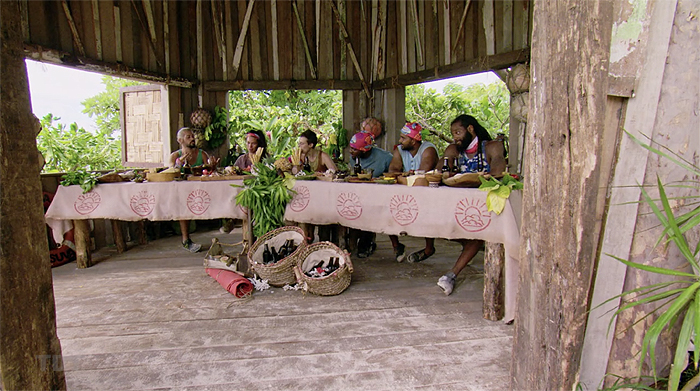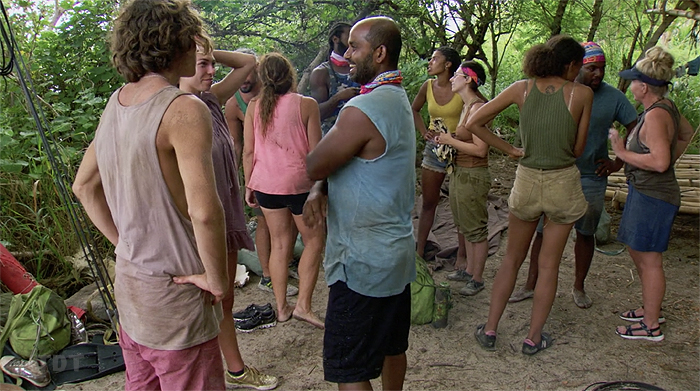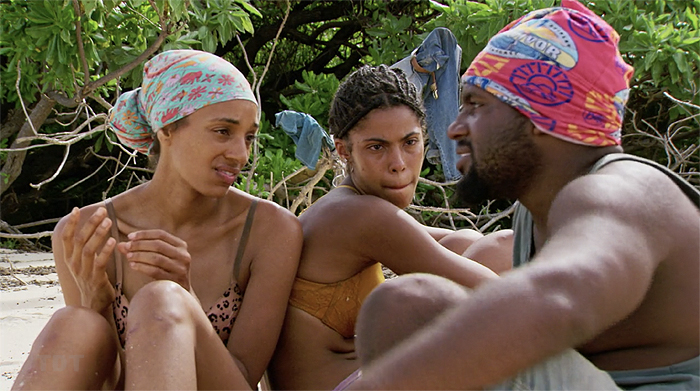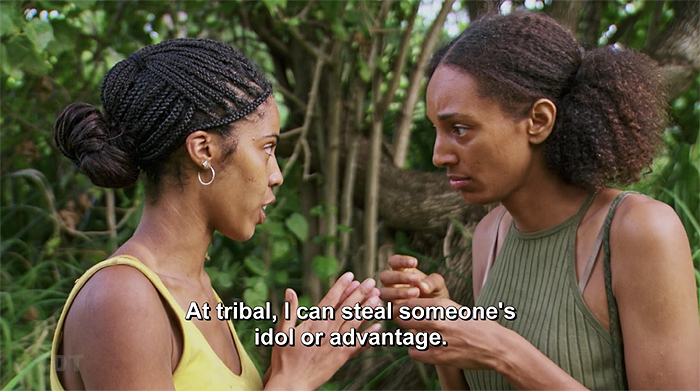

At long last, US Survivor has finally completed its heist of Australian Survivor's game mechanics, shoehorning into one of the most anticipated episodes of the season the absolute pinnacle of Aussie entertainment engineering: The non-elimination episode.
It's the kind of episode that — mired in the depths of the 24-episode, 4-plus-hours a week grind that SurvivorAU seasons can sometimes be — just makes you want to tear your hair out. In a SurvivorAU non-elimination, you're left feeling like nothing mattered: not the challenges, not the plotting, not idol/advantage intrigue, not the vote, nothing. It was all erased by some smashed urn or surprise swap to the other tribe (replacing the boot), or whatever cockamamie scheme AU came up with that week (circa three times a season).
Can US Survivor capture that magic? Yes, they can.
But US Survivor, unwilling to merely "copy" SurvivorAU, decided to one-up them in the meaninglessness: This was a non-elimination episode that didn't even have a vote! It was just a regular episode that, for no obvious reason, hit Pause (or possibly Reset) halfway through.
(The opening paragraph was of course sarcasm. Everyone in the audience hates AU's non-elimination episodes. They're allegedly there in SurvivorAU because of a network requirement for 24 episodes, which requires either multiple non-boots or expanding the cast from the already-unwieldy 24 contestants to a ridiculous number, like 27. But US Survivor? Demonstrating to perfection their utter inability to gauge audience opinion on literally any topic, decided to do this just for "fun.")
In the grand scheme of things, it's irritating, but it's not the end of the world. We'll get the rest of the episode next week, so the only plausible grade here is "incomplete." It's just a dumb decision that resulted in a dumb episode that felt like a waste of time, as Andy Dehnart pointed out. Survivor wanted to get the audience talking, and it worked, they did, in a near-universal chorus of boos. No doubt Probst immediately clamped his hands to his ears and will now bring this exciting twist back, with slight modifications, every season for the next five years, until someone in production finally has the guts to tell him that everyone hates it. (Unless Mike White does so first.)
This decision is also particularly short-sighted for the alleged "new era" of Survivor in light of the current TV environment. Survivor is no longer expanding its audience with live, first-run episodes on network TV. Almost nobody watches TV like that any more. The future of Survivor, (as well as 40 seasons of the past that Probst is so eager to take a hammer to), is streaming.
It was a huge deal last year when Netflix added S20: Heroes vs. Villains and S28: Cagayan. Traffic to this here site almost doubled when people — mostly people new to the show, based on their tweets — were watching it last year. Netflix is adding S16: Micronesia and S37: David vs. Goliath in mid-November. (In theory, people can already watch these series on Paramount+ or Amazon Prime or Hulu, but we all know which service actually has the eyeballs.)
So this "cliffhanger" merge episode will eventually play to a streaming audience, who will most likely just autoplay past the "end of Episode 6" part and go right on to Episode 7 without lifting a finger. They won't be the ones let down by this, it'll just seem like the episode ran slightly longer than usual.
No, the only people left disappointed from this are the
lingering remnants of the core audience, the lifers, the ones
who've been tuning in every Wednesday (er, Thursday, er,
Wednesday) since 2000. Because whenever Probst sees an
opportunity to piss off those jerks, he makes sure he does so.
How can you possibly screw up a merge episode? Let's find out!

After the premiere, the merge episode probably rivals the finale as the second-most important, certainly one of the most anticipated episodes, season after season. It's where the game really starts. It's where people are "Ready to Play Like a Lion."
Since nobody voted, that didn't happen here. Not much of anything happened here. And what did happen could all be smashed away next week.
What's most disappointing about this limp, disengaging bastardization of the merge is: There was no reason for it. It would feel less disappointing back-to-back with next week's episode, and there's no doubt the two episodes would have fit in one hour. There were still 15 minutes left to go after Erika acclimates herself to Exile, and literally nothing happens the rest of the way. We didn't need to see all three tribes reading treemail. The team IC ate up close to 12 minutes. Things could have been cut here, there, and everywhere. This was a "two-part episode" by choice. And it was a poor choice.
That's because it's not a real "cliffhanger." There's no danger, barely any suspense, since the individual challenge hasn't been run. Everyone is theoretically in the same indeterminate quantum state, like a dozen Schrödinger's cats, both safe AND vulnerable, until Erika's decision is made. In merge-atory, you might say, especially if you are Xander.
What was production thinking? The only possible explanation is the obvious one: They didn't trust this cast — one of the best in years — to make the game interesting. This twist was probably greenlit because, especially in recent three-tribe seasons (HvHvH, Kaoh Rong), the merge is sometimes underwhelming. As Deshawn rightly worried last episode, Luvu hitting the merge "six strong" against a combined Yase + Ua (which then had seven), would make that tribe a ripe target.
But that was a theoretical concern. The actual merge worked out perfectly! There were exactly even numbers (six vs. six), and as both Sydney and Deshawn pointed out, Luvu is in a shambles for never having voted. So are Yase and Ua, who are all secretly plotting against each other. Things are already falling apart in interesting ways, right now. So why keep going with this dumb twist, which replaced an event that had organically turned out perfectly, with this over-determined, game-breaking intervention that also turns out to be actively boring (because again, there's no real suspense, and it feels like we probably wasted most of this first hour)?
Why would production not trust a cast full of superfan gamers, eager to play, anxious to make an exciting merge episode, when the game had turned out the way it did? Why not just ditch this dumb plan, save this week's challenge for a later team RC, let everyone have a normal merge feast, and move forward with the individual challenge in two days? Why insist on the bullshit "You must EARN the right to merge" message, when the whole "earning" part is actually dependent on the whims of a player who was forced to sit out of the challenge by the same dumb twist?
Most importantly, what was gained? It's really hard to say. We did get Erika's backstory, which was nice. We could have had a few more of those in the two-hour premiere, but whatever. (Then again, in Australian Survivor, backstories this late in the season are a huge red flag for an imminent boot.) We did get six people thrilled to reach the merge and don merge buffs, people who are probably going to be devastated next week when that is taken away again.
So what's the point of all this twisting? What are the contestants, or the audience, supposed to learn? That everything is as random as a rock draw, and anything can be arbitrarily changed at any time? Despite the host repeatedly saying you have to "earn" things, it's a far better deal to sit out, not bloody yourself up in the challenge, and receive a nice gift at the end? It's the hardest season ever, unless you get massive power handed to you because you drew a gray rock? Massive power that no matter what you choose, will also probably torpedo your own game by forcing you to piss off half the players?
This episode's ad breaks had more of Probst's full-throated pleas for more people to apply to play in seasons 43-44. If you're a long-term fan of the show, why would you do this? What part of this absolute blindfolded circular firing squad of a season stands out to you as "Survivor"-y? People being forced to be away from everyone else so they can't scheme and plot with their tribemates, each and every episode, including even the merge? Attaching random penalties to the idols? Challenge outcomes that can be reversed just because production thought it might be amusing? What makes you think, after progressively forgetting more and more of it over his 22 seasons at the helm, Probst will magically re-discover what was great about Survivor in the first place, right before you play?
Once upon a time, Survivor was about creative, competitive, socially/strategically clever people taking a game with a limited set of rules that everyone knew, and coming up with ways to convince people they've just met to help them get to the end, while still liking them enough to give them a million dollars after having been voted out. Today, it's a 14-episode exercise in rules that only some people know, piled on top of other unknowable rules (often read at length, on camera), dodging booby traps and landmines, while occasionally getting lucky and having something fall into your lap, all while having the host actively lie to you along the way about what's actually happening. Also while starving, because suffering = entertainment, I guess?
Ryan Kaiser was right.
Next time on #Survivor: pic.twitter.com/dILysyhN9r
— Ryan Kaiser (@Ryan__Kaiser) October 11, 2021
Stop whining about a possible all-Black alliance, you absolute bigots

It was just five years ago, 17 years into Survivor's run, that Cirie and Michaela noted happily (but also grimly) that Game Changers was the first time ever that two Black women had made the merge together. Seventeen years.
For most of the show's early seasons, the cast would consist of 14-plus White contestants, and 2-3 non-White contestants. Often one Black man, one Black woman. Sometimes one (almost always only one) Asian-American or a Latina thrown in for variety. Even when the overall cast size swole to 20 players in Palau: One Black man, one Black woman, one Latina. Outside of the magical anomaly of Cook Islands/Fiji, this pattern held strong until well into the 30s, such that there were only two seasons in Survivor's first 40 (again, not counting S13-S14) that featured more than three Black people in a single cast: Cagayan and David vs. Goliath. They had four each. And in both of those cases, two or more were gone by the merge.
So Deshawn was absolutely spot-on when he said he hadn't thought he would get to play with other Black people. As we analyzed in detail a year ago, the chances were, as a Black man, the one Black woman on his cast would be voted against, if not out, at her tribe's first Tribal Council.
That's not due to explicit racism necessarily, but rather the truism that early Survivor votes are always about people wanting to be with other people like them, and targeting someone who stands out as different. If there's one Black person and seven White people, there's one very visible thing that stands out. If it's a far more mixed tribe ethnically, other characteristics will take precedence.
Thankfully, Survivor has made huge strides towards greater contestant diversity, starting with the Island of the Idols cast (9/20 non-White players), and now with CBS's pledge to maintain at least 50% BIPOC casting moving forward, that will be the new standard. For the audience, this move has been great so far, because we get to hear new stories, new perspectives, like Naseer's (the first Sri Lankan man to play Survivor), or Vince Moua's (the first Hmong-American player), or this week, Erika's as a Filipina-Canadian. Survivor still has a long way to go with Latinx representation, with just Big Wendy and Ricard in the last three new casts (Los Angeles County is 40% Hispanic, the largest ethnic group by population, but the people recruited from LA County are almost always White, despite there being no shortage of Latinx superfans), but hopefully that will change too.
So anyway, here we are in 2021, and for just the second time ever (Island of the Idols was the first), four Black people have made the merge together. (Sort of, since only two have merge buffs so far.) So why are (almost exclusively White) people so *upset* about these four people wanting to work together, just based on this one thing they have in common? (Keeping in mind they were already two pairs?) They're four out of 12. They have very little collective power at the moment. Do those same viewers put as much energy into concern-trolling Danny's hope for the five men to stick together? (Spoiler: nope.) Were the same people "troubled" by Tony and Sarah forming "Cops-R-Us" in Cagayan, terrified that it would set a bad precedent, and "worried" that future non-cop players are going to vote out all the police officers as soon as they could? (Ha ha, nope.)
Can't people just be happy for Danny, Deshawn, Liana, and Shan that four Black people made it to the merge for just the second time ever? (Again, maybe, because "merge.") Liana explained what it meant to her perfectly: "As people of color, there is a shared experience. You immediately have this bond, you're like, 'Oh, you were the only person in your classroom who looks like you? Me too!'" What part of that is so worrisome, exactly?
It's hard to see the very vocal opposition to Liana's stated goal of "wanting to uplift each other" as anything other than wanting to keep Black people in their place, and not let them get ahead. They're not fooling anyone with their claims of "not wanting Survivor to be about race." Context matters. History matters. It's pretty clear what their objections are actually about.
Shorter takes

- Is Liana really as anti-Xander as people say? Yes, she did state before the merge that she wanted to target him, but later in this episode, Liana (reluctantly) told both Shan and Tiffany the details about how her Knowledge is Power advantage works. Each time, when she mentioned stealing the vote, she led with "So I could take Naseer's idol," and the other person cut in with "or Xander!" Neither time did Liana throw Xander's name out first.
Despite that, Tiffany comes back from that conversation and relays it in confessional as "Liana is continuing to hold this emotional tie with wanting Xander out, and she's gunning for one of our own. That's a problem." Hmm, it didn't look like the problem was really with Liana?
- Erika's no-win decision: Despite presenting her with the unprecedented power to reverse the results of a challenge, Probst and his twist did Erika absolutely zero favors here. She was already on the bottom of Luvu. By taking her away from the merge camp for two days, she not only is an easy target for those same people (as we saw), she also has no opportunity to talk to the people from the other tribes, who might have wanted to work with her. And no matter what outcome she chooses with the hourglass, six people are going to be mad at her. That seems super fair.
 Jeff
Pitman is the founder of the True Dork Times,
and probably should find better things to write about than
Survivor. So far he hasn't, though. He's also responsible
for the Survivometer, calendar, boxscores, and contestant
pages, so if you want to complain about those, do so in
the comments, or on twitter: @truedorktimes
Jeff
Pitman is the founder of the True Dork Times,
and probably should find better things to write about than
Survivor. So far he hasn't, though. He's also responsible
for the Survivometer, calendar, boxscores, and contestant
pages, so if you want to complain about those, do so in
the comments, or on twitter: @truedorktimes
ADVERTISEMENT